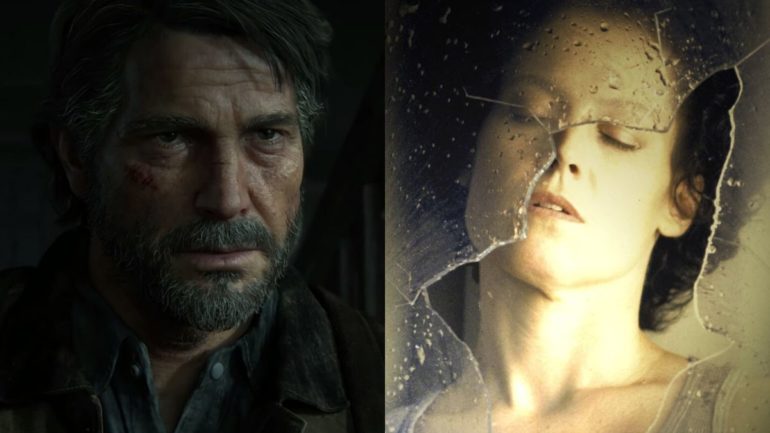Serious spoilers for The Last of Us Part II and Alien 3 follow.
Going into the next chapter of a story can be a daunting prospect. You may find yourself with an overwhelming sense of excitement, especially if it’s a much-anticipated sequel to a franchise you have an emotional investment in. Perhaps you’ve waited years to see your favourite characters go on their next adventure. However, there can also be a sense of apprehension and fear. What if it isn’t everything you expected it to be? What if the hype behind it was just a recipe for disappointment? Sometimes it is so much less than what you hoped for. And so it was that some fans of The Last of Us went into the second game and felt the same way many people did watching Alien 3 for the first time.
I, like many people around the world, was absolutely excited for The Last of Us Part II. Like many gamers, I had fallen in love with the story and characters of the first game, watching Joel and Ellie adventure across the ruins of a post-apocalyptic America, all the while enjoying the surrogate father-daughter relationship that developed between them. So, imagine the shock when I, along with Ellie, watched one of gaming’s most beloved protagonists get killed in an unceremonious fashion with no fanfare.
It was a blow that made little sense: it wasn’t in touch with what we knew about the character, was implemented for shock value, and used as a simple plot device without proper care.
For me, there was a little bell ringing in the back of my head. I had seen something like this before.
My dad was a huge movie buff, and one of the film series he got me into was Alien. Though the first one spooked me, the second one was an adrenaline-fuelled adventure into a nightmarish world where I grew to care for the familial element between the protagonists Ripley, Hicks, and Newt. So, when I went into Alien 3, I was crushed when Hicks and Newt were killed in the opening of the story, like many fans were when it first came out in 1992. Similarly to The Last of Us, it felt implemented more for shock value than any deeper meaning.
It can be argued that the settings of both stories are harsh, unforgiving worlds and that no one is safe. In the same vein, it can be debated that if these characters were to live throughout the story, it would just be a rehash of the previous instalment. However, these are also fictional universes, where the character’s lives, motivations and even their deaths should carry meaning to the overall story you are trying to tell. These projects didn’t allow their characters the deaths they deserved.
So, how can they be fixed?
In the context of the Alien franchise, let’s take a look at Hicks and Newt. Hicks was the only surviving soldier from his squad, had chemistry with Ripley and looked after Newt. He was a badass, a brutal survivor with a caring side. Newt was also the only survivor of her colony’s massacre and became Ripley’s surrogate daughter. So, for their deaths to add additional meaning to the story, they should be keeping in theme with their characters: maybe Hicks goes out in a blaze of glory trying to defend these people he has grown to care for while Newt meets an unfortunate end as a result of Ripley failing to protect her. You achieve the same shock value watching someone you’ve grown to care for die in front of you, all the while adding that little bit of extra flavour to the story.
The same goes for Joel in The Last of Us. He was also a hardy survivor that lived in the apocalypse for the better part of thirty years. He was distrusting of most people, even acting disinterested towards Ellie when he first met her. Even him losing his biological daughter in the first game acts to establish character instead of just shock the audience. More important than all that is the relationship that he built with Ellie. Fans of the game have spent hours with these characters and watching them grow together. If you want to kill off Joel, have it carry much deeper weight. Let him die defending the person he cares for the most. It gives their narrative more flow, allowing their story to end on a bittersweet conclusion.
There is absolutely nothing wrong with killing main characters to serve the story. If done right, snuffing out the life of someone who you have suffered along with can provide for interesting conflict in the story. There are many examples of character deaths done right in stories, both video games and films: Lord of the Rings, Metal Gear Solid, Harry Potter, Red Dead Redemption, The Walking Dead — the list goes on and on. The way Alien 3 killed its beloved characters in the nineties shocked fans and hurt the project the same way The Last of Us 2 has been affected now. These both serve as a lesson to storytelling.
If you’re going to kill a character, make it mean something beyond shock.
The Last of Us Part II is out now exclusively for the PlayStation 4. From our review:
“In trying to subvert expectations, The Last of Us Part II discards the best aspects of its predecessor to provide a rote revenge tale that is ill-considered, ending on a note that makes everything — all the violence, all the loss, all the struggle — feel utterly, hopelessly pointless.”
READ NEXT: This Uncharted 4 Easter Egg Sets Up The Last of Us Part II
Some of the coverage you find on Cultured Vultures contains affiliate links, which provide us with small commissions based on purchases made from visiting our site. We cover gaming news, movie reviews, wrestling and much more.




